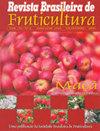Coefficient of repeatability, stability,and adaptability estimates for Psidium guajava S1 progenies via mixed models
IF 0.9
4区 农林科学
Q4 HORTICULTURE
引用次数: 1
Abstract
Abstract This study intends to estimate the coefficient of repeatability for traits relating to yield, so as to infer what is the minimum number of evaluations required to identify superior genotypes; to verify adaptability and stability; to predict genetic gains; and to select the best families and in S1 progenies of Psidium guajava. Families were obtained by means of self-fertilization of superior genotypes (full sibs) from the guava tree genetic breeding program of the UENF. The experiment was implemented at the Experimental Station of Ilha Barra do Pomba, in the municipality of Itaocara-RJ. In this case, an experimental randomized block design was used with 18 inbred families, three replicates, and ten plants per plot. Inbred families were evaluated in three harvests regarding fruit weight, number of fruits per plant, and total yield. It was then conducted an analysis of repeatability, adaptability, and stability of genotypes by means of the Selegen/REML/BLUP program. Repeatability values show that the performance of genotypes is constant among measurements, suggesting the need to perform only three evaluations for the selection of superior genotypes. There was agreement on the choice of families 1, 4, 6, and 12 as the most yielded, adaptable, and stable for the traits evaluated.利用混合模型估计瓜爪哇紫荆S1后代的可重复性、稳定性和适应性系数
摘要本研究旨在估算与产量相关性状的可重复性系数,从而推断出鉴定优质基因型所需的最小评价次数;验证适应性和稳定性;预测遗传收益;选择瓜爪哇的最佳家族和S1个后代。通过对番石榴树遗传育种项目中优势基因型(全兄妹)的自交受精获得了不同的家系。该实验在伊塔奥卡拉- rj市的Ilha Barra do Pomba实验站进行。本试验采用试验随机区组设计,18个自交系,3个重复,每小区10株。对近交系进行了三次果实重、单株果数和总产量评价。然后利用Selegen/REML/BLUP程序对基因型的重复性、适应性和稳定性进行分析。重复性值表明,基因型的性能在测量中是恒定的,这表明只需要进行三次评估就可以选择优质基因型。选择家系1、4、6和12是评价性状产量最高、适应性最强和稳定性最好的。
本文章由计算机程序翻译,如有差异,请以英文原文为准。
求助全文
约1分钟内获得全文
求助全文
来源期刊
CiteScore
1.50
自引率
20.00%
发文量
34
审稿时长
4-8 weeks
期刊介绍:
The Revista Brasileira de Fruticultura (RBF) publishes technical articles and scientific communications in the area of fruit crops, referring to results of original searches and unpublished papers in Portuguese, Spanish or English, and 1 or 2 reviews per edition, of invited authors.

 求助内容:
求助内容: 应助结果提醒方式:
应助结果提醒方式:


